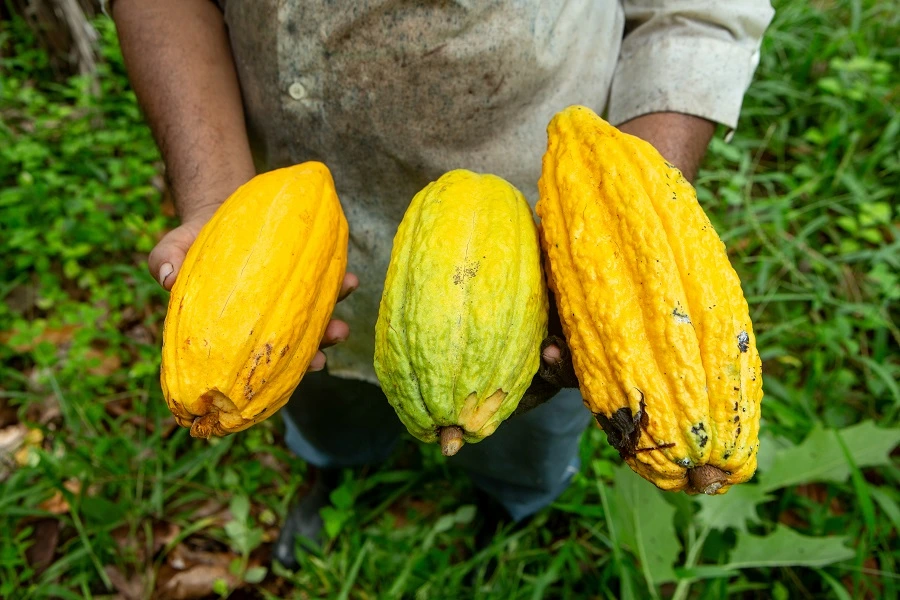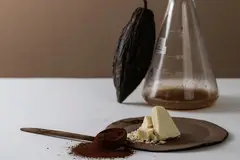
- Industry news
Industry news
- Category news
Category news
- Reports
- Key trends
- Multimedia
- Journal
- Events
- Suppliers
- Home
- Industry news
Industry news
- Category news
Category news
- Reports
- Key trends
- Multimedia
- Events
- Suppliers
Celleste Bio launches cell-cultured cocoa butter amid supply challenges
Key takeaways
- Celleste Bio has introduced the first chocolate-grade cocoa butter made using plant cell culture technology.
- The innovation aims to support cocoa supply stability amid ongoing market challenges.
- The company uses biotech, AgTech, and AI to produce sustainable, scalable cocoa ingredients with zero waste.
Cocoa tech company Celleste Bio has unveiled its chocolate-grade cocoa butter, which it claims is the “first” to be formulated using plant cell culture technology. The ingredient is “bio-identical” to cocoa butter extracted from cocoa beans, chemically and functionally, and aims to bolster climate-resilient cocoa supply amid rising cocoa prices.
Last year, cocoa prices spiked by nearly 400% due to a half-billion-metric ton shortage, spurring substitute innovations to ease supply constraint challenges. Cocoa butter accounts for almost half of the US$16 billion that chocolate manufacturers spend on cocoa ingredients annually.
The Israel-based firm hails the cultivated cocoa butter as a “breakthrough.” It yields the same fatty acid profile essential for producing real chocolate and provides similar sensory qualities such as melting point, smooth texture, and that characteristic “snap” of premium chocolate.

“Our ability to produce real cocoa butter via cell culture proves that science can be used to grow and produce ingredients that mirror nature with integrity and transparency,” says Michal Berresi Golomb, CEO of Celleste Bio.
“This is a major R&D achievement for Celleste, led by Hanne Volpin, Ph.D., CTO of Celleste, and her R&D team, and also validation for the entire cocoa industry that there is a solution to supplement supply chain shortages caused by the volatility and unpredictability of traditional farming.”
Driving scalability and sustainability
Celleste Bio’s cocoa butter is designed for scalability to enable stable, sustainable production independent of agricultural limitations.
The ingredient generates zero waste by using all inputs efficiently throughout the process.
Celleste uses a proprietary combination of biotech, AgTech, and computational AI to produce 100% natural cocoa ingredients from one or two beans in optimal, controlled conditions throughout the year.
The company launched the chocolate-grade cocoa butter this week at EIT Food’s Next Bite Summit in Brussels, Belgium.
 While technology is important to stabilize crop future, it doesn’t replace farming, and is an “insurance policy” against supply chain shocks, according to Howard Yano Shapiro, retired chief agriculture officer at Mars, Inc.
While technology is important to stabilize crop future, it doesn’t replace farming, and is an “insurance policy” against supply chain shocks, according to Howard Yano Shapiro, retired chief agriculture officer at Mars, Inc.
Overcoming cocoa crisis
While cocoa prices and crop yields stabilize at certain points, experts say long-term instability is the “new normal” and technology is the only way to stabilize the future, underscores Celleste Bio.
Howard Yano Shapiro, retired chief agriculture officer at Mars, Incorporated, emphasizes the importance of technology but says it does not replace traditional farming.
“It is an ‘insurance policy’ against imminent supply chain disruptions and destruction caused by pests, disease, land and water overuse — as well as those that will arise from climate and agricultural instability.”
He adds that Celleste Bio’s cell culture technology is getting ahead of a long-term crisis. “Cocoa butter is the single most important, expensive, and resource-intensive ingredient in chocolate, and if we’ve learned anything from last year, it’s that solutions for crop supplementation are crucial.”
Celleste Bio is now building a pilot facility to accelerate R&D and scale production of its cocoa ingredients. The company, which has raised US$5.6 million to date, aims to create an economically and environmentally sustainable cocoa supply. Mondelēz International is the company’s strategic and design partner.













